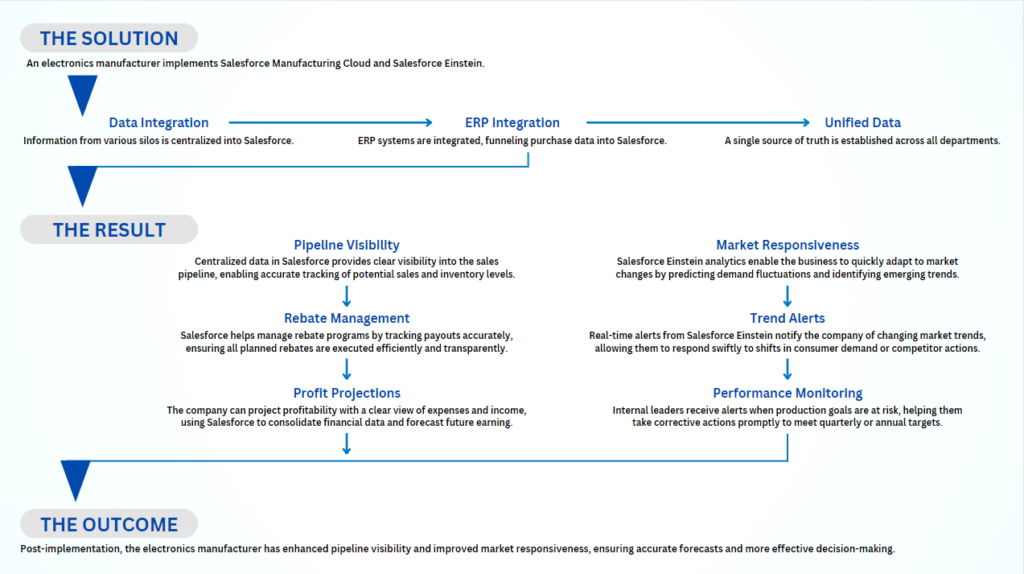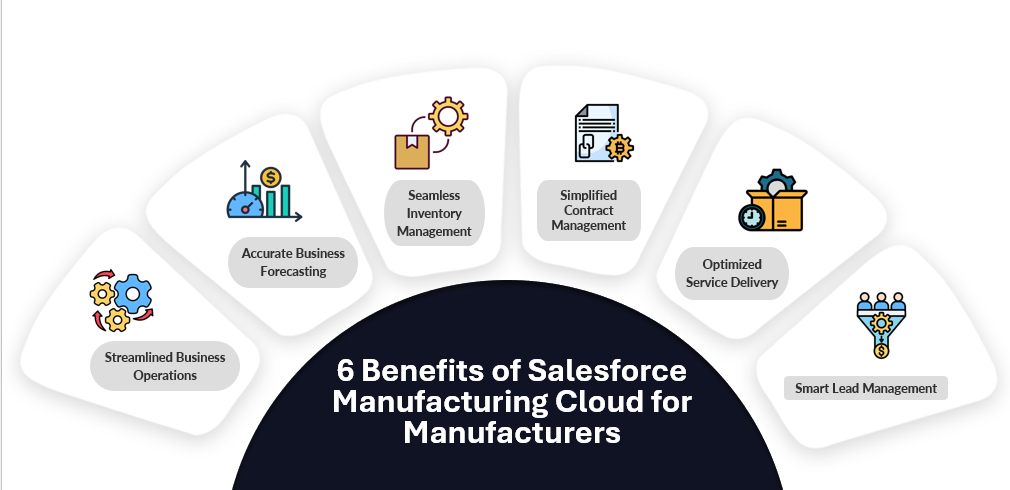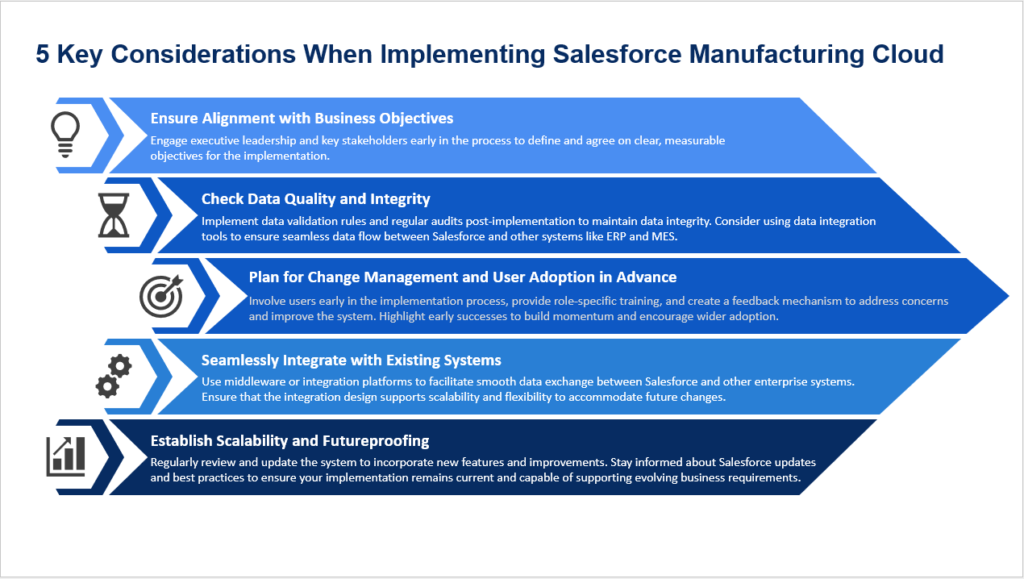In an era where efficiency, precision, and agility are essential, manufacturers are constantly looking for new ways to optimize their processes and stay ahead of the competition.
Salesforce Manufacturing Cloud is a robust, cloud-based platform built expressly to meet the unique challenges that manufacturers encounter. It provides unrivalled visibility, greater collaboration, and enhanced decision-making capabilities by combining important components of the production process into a single system.
This blog covers Salesforce Manufacturing Cloud’s disruptive influence, outlining its features, benefits, and practical use-cases to demonstrate why it is a must-have tool for modern manufacturers.
Let’s dive right in!
What is Salesforce Manufacturing Cloud?
Salesforce Manufacturing Cloud is a cloud-based solution created exclusively for manufacturers.
This cloud platform connects departments and partners with ease and offers a comprehensive view of your business. It incorporates aspects unique to manufacturing into the already-existing Sales and Service Clouds in Salesforce. It provides a unified experience without the complexity of a separate software layer because it is built on the Salesforce Customer 360 platform.
Because of its adaptability, you can tailor the implementation to your own requirements. Depending on your unique needs, you can decide to adopt Manufacturing Cloud for Sales just, Manufacturing Cloud for Service only, or even both. Additionally, users of Manufacturing Cloud can collaborate with users using the regular Sales Cloud or Service Cloud.
In fact, integration with your existing back-office systems like ERP (Enterprise Resource Planning) and OMS (Order Management Systems) is also conceivable. This can be achieved through APIs (Application Programming Interfaces), the MuleSoft Accelerator for Manufacturing, or other middleware solutions.
Who is Salesforce Manufacturing Cloud for?
The adaptability of Salesforce Manufacturing Cloud is what makes it so beautiful. Businesses of all sizes and in a variety of industries can utilize it to realize its full potential and obtain a sizable competitive advantage.
- Discrete manufacturers can use the cloud to handle complicated product lifecycles for everything from electronics and cars to medical and aerospace devices.
- Businesses that produce food and beverages, chemicals, and medications.
- Businesses that focus on contract manufacturing.
- Gas and Oil Extractors.
- Continuous, long-term, or run-rate business management.
Salesforce Manufacturing Cloud gives a wide range of manufacturing ecosystem participants the tools they need to succeed in today’s competitive and dynamic environment by offering a complete and flexible platform.
How Salesforce Manufacturing Cloud Works?
Here’s a use-case to understand Manufacturing Cloud in action.

6 Reasons Manufacturers Need Salesforce Manufacturing Cloud Right Now [Benefits]
Staying ahead in the competitive manufacturing landscape requires more than just robust production capabilities. It demands a seamless integration of all business processes, from sales and production to inventory management and customer service. Salesforce Manufacturing Cloud provides a comprehensive solution to these challenges, offering a unified platform that enhances operational efficiency, accurate forecasting, and customer satisfaction.
Here are six compelling reasons why manufacturers need Manufacturing Cloud right now:

1. Streamlined Business Operations
Envision a single, easily managed platform that manages all aspect of your manufacturing ecosystem, from sales and production to collaboration and service. This is what the Manufacturing Cloud is all about. It creates a smooth workflow by tearing down fragmented systems and compartmentalized data, enabling your team to work more effectively and clearly.
Prior to the introduction of the Manufacturing Cloud, different divisions within a manufacturing company frequently functioned independently from one another and had little insight into one another’s daily activities. This compartmentalized methodology frequently led to ineffective processes, imprecise projections, and restricted cooperation. Disconnected teams found it difficult to work together successfully, which stifled creativity and problem-solving.
By uniting all aspects of your manufacturing processes onto a single platform, Manufacturing Cloud addresses these issues. This promotes smooth departmental collaboration and well-informed decision-making by enabling real-time transparency.
2. Accurate Business Forecasting
Any successful firm relies on accurate forecasting, but in the dynamic world of manufacturing, this may be a challenging task. You can use advanced forecasting tools with Manufacturing Cloud, which utilizes market trends, customer insights, and historical data. This enables you to:
- Make data-driven decisions: To optimize production schedules, manage resources effectively, and forecast market developments, rely on verifiable data rather than gut instinct and intuition.
- Anticipate demand fluctuations: Prepare for demand swings by spotting emerging trends and proactively modifying your production schedules to accommodate shifting consumer demands. This keeps extra inventory from building up unnecessarily and reduces the chance of stockouts.
- Increase profitability: You can cut production costs, use resources more efficiently, and ultimately maximize profitability by basing decisions on accurate forecasts.
3. Seamless Inventory Management
With Manufacturing Cloud, you can see your inventory levels in real time at different locations. Envision being able to see your complete inventory in vivid detail, including:
- Raw materials: To prevent manufacturing delays, keep an eye on the availability of raw materials and proactively start the reordering process.
- Work-in-progress (WIP): Monitor the advancement of unfinished goods through several manufacturing phases, pinpointing obstructions and refining the flow of production.
- Finished goods: Get up-to-date information on stock levels of finished products, which enables you to predict possible shortages and adjust your production schedules appropriately.
With this level of transparency, you can:
- Lower the chance of stockouts: Maintain sufficient finished goods inventory levels to guarantee prompt deliveries and prevent client displeasure.
- Reduce carrying costs: By streamlining your ordering procedures and keeping your inventory levels low, you can avoid the financial strain of holding extra inventory.
- Improve decision-making: Use real-time inventory data to influence choices about purchase tactics, resource allocation, and production scheduling.
4. Simplified Contract Management
Elaborate manual contract updates are a thing of the past. Manufacturing Cloud enables you to electronically handle contracts with partners and suppliers. This minimizes the inefficiencies associated with paper-based systems and provides various advantages.
- Real-time updates: When modifications are made to a contract, all parties involved have quick access to the most up-to-date information. This reduces confusion and the possibility of mistakes by ensuring that everyone is working with the most recent information.
- Improved cooperation: The cloud-based platform allows for continuous communication on contracts throughout the process. This enables prompt agreement finalization, effective negotiating, and real-time feedback.
- Improved efficiency: Manufacturing Cloud enhances productivity by streamlining the contract administration procedure, saving time and money for core business operations.
5. Optimized Service Delivery
Manufacturing Cloud gives your business the tools it needs to optimize service operations and boost customer satisfaction to new heights. Consider being able to:
- Track and manage all customer enquiries from a single, centralized platform. This guarantees that all client contacts are easily accessible and documented, and it removes the need to browse multiple systems.
- Process warranty claims in an efficient manner to ensure quick decisions and reduce wait times for customers. This increases consumer loyalty and builds trust.
- Efficiently arrange maintenance visits to minimize operational disruptions and ensure smooth communication with customers.
That’s exactly what Manufacturing Cloud offers. With this platform, manufacturers can:
- Ensure timely issue resolution: Respond to client concerns quickly, demonstrating your dedication to providing outstanding service.
- Increase customer satisfaction: By swiftly resolving concerns and going above and beyond, you may create great client experiences that lead to increased loyalty and repeat business.
- Develop long-term client relations: Establishing solid customer relationships is critical for long-term success. Manufacturing Cloud gives you the ability to provide outstanding customer service that builds trust and motivates clients to pick you above the competition.
6. Smart Lead Management
Manufacturing Cloud provides your sales team with a powerful lead management solution tailored to the requirements of the manufacturing business. This approach offers the significant benefits:
- Accurate Lead Tracking: Get a complete picture of each lead’s journey, from first contact to ultimate conversion. This makes it possible for your sales staff to locate and remove any obstacles that might be impeding the conversion process.
- Bottleneck Identification: Identify any bottlenecks that may hinder lead conversion. This could include delays in getting quotations, failure to meet technical criteria, or trouble contacting decision-makers inside the customer company.
- Proactive Engagement: Give your sales force the resources they need to act quickly and strategically to nurture prospects and solve problems as they arise. This proactive strategy improves client interactions and raises the possibility that leads may become devoted patrons.
By leveraging Salesforce Manufacturing Cloud, your sales team can increase sales pipeline visibility, embrace a customer-centric approach, and boost your bottom line.
5 Common Use-Cases Leveraging Salesforce Manufacturing Cloud
Salesforce Manufacturing Cloud is designed to address the unique challenges faced by manufacturers in today’s competitive landscape. By leveraging its advanced features and capabilities, manufacturers can streamline their operations, improve collaboration, and enhance customer relationships.
Here are five compelling use cases that demonstrate the value of Salesforce Manufacturing Cloud:
1. Demand Forecasting and Production Planning
- Use Case: A manufacturer needs to accurately forecast product demand to plan production schedules and inventory levels.
- Solution: Salesforce Manufacturing Cloud uses AI-driven insights and historical data to provide precise demand forecasts, enabling the manufacturer to optimize production schedules and manage inventory more effectively.
2. Sales and Operations Collaboration
- Use Case: Sales and operations teams at a manufacturing company struggle to stay aligned, leading to missed sales opportunities and production inefficiencies.
- Solution: The platform integrates sales agreements with operational data, providing a unified view that ensures both teams are working towards the same goals. Real-time visibility into customer orders and production capacities helps improve coordination and decision-making.
3. Customer Relationship Management
- Use Case: A manufacturer needs to maintain strong relationships with multiple B2B customers while managing complex sales cycles.
- Solution: Salesforce Manufacturing Cloud offers comprehensive CRM capabilities, allowing the manufacturer to track customer interactions, manage sales activities, and provide personalized service, leading to improved customer satisfaction and retention.
4. Contract and Agreement Management
- Use Case: A manufacturing company has difficulty managing and tracking complex contracts with various customers and suppliers.
- Solution: The platform includes tools for creating, managing, and tracking contracts and agreements, ensuring compliance and reducing administrative overhead. This streamlines contract management processes and improves accuracy in fulfilling contractual obligations.
5. Supply Chain and Inventory Optimization
- Use Case: A manufacturer faces challenges in maintaining optimal inventory levels and ensuring smooth supply chain operations.
- Solution: Salesforce Manufacturing Cloud provides real-time insights into supply chain and inventory data, helping the manufacturer optimize inventory levels, reduce carrying costs, and improve supply chain efficiency. This ensures that the right products are available at the right time, enhancing overall operational efficiency.
5 Key Considerations When Implementing Salesforce Manufacturing Cloud

Salesforce Manufacturing Cloud can dramatically improve the productivity and efficacy of your manufacturing operations. But to get the maximum benefits, implementation must be done strategically. The following five crucial considerations will guarantee a smooth launch and sustained platform success:
1. Ensure Alignment with Business Objectives
Ensure that the implementation of Salesforce Manufacturing Cloud aligns with your organization’s overall business strategy and objectives.
Identify specific business goals such as improving sales and operations alignment, enhancing demand forecasting accuracy, or streamlining contract management.
Best Practice
Engage executive leadership and key stakeholders early in the process to define and agree on clear, measurable objectives for the implementation.
2. Check Data Quality and Integrity
High-quality, accurate data is crucial for the success of any CRM implementation.
Conduct a thorough data audit before migration, cleanse data to remove duplicates, and ensure consistency across all systems.
Best Practice
Implement data validation rules and regular audits post-implementation to maintain data integrity. Consider using data integration tools to ensure seamless data flow between Salesforce and other systems like ERP and MES.
3. Plan for Change Management and User Adoption in Advance
The success of the implementation depends significantly on how well users adopt the new system.
Develop and execute a comprehensive change management plan that includes communication, training, and support.
Best Practice
Involve users early in the implementation process, provide role-specific training, and create a feedback mechanism to address concerns and improve the system. Highlight early successes to build momentum and encourage wider adoption.
4. Seamlessly Integrate with Existing Systems
Seamless integration with existing ERP, CRM, and supply chain systems is vital for efficient operations.
Plan the integration strategy carefully, considering both real-time data syncing and batch processing needs.
Best Practice
Use middleware or integration platforms to facilitate smooth data exchange between Salesforce and other enterprise systems. Ensure that the integration design supports scalability and flexibility to accommodate future changes.
5. Establish Scalability and Futureproofing
The implemented solution should be scalable to support future growth and adaptable to changing business needs.
Design the solution architecture with scalability in mind, allowing for easy addition of new users, increased data volumes, and integration with additional systems.
Best Practice
Regularly review and update the system to incorporate new features and improvements. Stay informed about Salesforce updates and best practices to ensure your implementation remains current and capable of supporting evolving business requirements.
By carefully considering these key aspects, your organization can maximize the benefits of Salesforce Manufacturing Cloud.
Next Steps
Salesforce Manufacturing Cloud is a game-changing platform that empowers your manufacturing operations, streamlines procedures, and unlocks vital data to move your company forward.
Manufacturing Cloud enables real-time collaboration, accurate forecasting, and streamlined inventory management by easily connecting with your existing systems. Additionally, it provides your teams with the tools they need to create a customer-centric approach through targeted lead management and streamlined service delivery.
Our Salesforce customization experts have the knowledge and experience to personalize Manufacturing Cloud to your specific requirements, ensuring it connects seamlessly with your existing infrastructure and reaches its full potential.
Book a 1:1 meeting with our experts to learn more.
Author

AVP, AblyPro

Murali is the AVP – Certinia at AblyPro with 12+ years of experience in handling complex Certinia and Salesforce applications, implementations, configurations, and customizations. At AblyPro, he has been the pillar of all the Certinia PSA and ERP project deliverables, ranging from design to implementation, project management, and resource management. With years of practical knowledge and expertise in this industry, Murali supports the sales team in strategizing customer solutions to meet the actual business needs of the clients. Murali is a dynamic and experienced professional with multiple Certinia and Salesforce certifications, helping businesses to technically strive in this ever-changing landscape.



